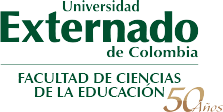9 de septiembre de 2019
Being Graduated from Externado University
Javier Alexis Junca, Ph.D.
Having studied at Externado University has been a very significant experience in my professional life. In the Master’s program with Emphasis on English Didactics, I learned to transform my pedagogical practices in the classroom through research and materials development. In this sense, during the educational process, I received from my professors to do my best as an educator. Sharing and helping others through education were fundamental principles that re-signified my pedagogical perspectives. The teachings provided by the lecturers and their reflections were a fundamental input to understand that one must teach with responsibility, creativity and love, in search for a more just and equal society.
The degree that I earned in the Master’s program allowed me to enter higher education and the Secretary of Education of Bogotá. These experiences helped me to qualify my abilities as a teacher, facing challenges and meeting new objectives in the professional and personal fields. In this sense, much of the knowledge acquired in my education process at Externado University was implemented and had a great impact on the pedagogical and educational activities that I developed in these institutions.
On the other hand, the progressive ideas promoted by the university led me to have a greater awareness of the social challenges that we face as a nation. In this process, the development of critical thinking skills allowed me to question the impact of education on society and in the construction of a better country, as well as, the role of teachers and their responsibility in school settings. Consequently, my pedagogical practices were developed through a constant reflection with the purpose of giving the best to students and institutions in which I worked.
Thanks to the support of the professors of the Master’s program, Astrid Núñez Pardo and María Fernanda Téllez Téllez, I earned a scholarship from the Swedish government in the “Child Rights Classroom and School Management Program” sponsored by the Swedish International Development Cooperation Agency. In this program, I was selected to travel with two other Colombian teachers to Lund – Sweden. We were able to take part in the Convention on the Rights of Children and its implementation in educational contexts. I studied with agents from different countries and it was an intercultural experience that broadened my vision of education worldwide. From this process, we designed a project that was implemented with English teachers from different educational institutions in Bosa locality. Later, we travelled to Malawi, in South Africa, with the purpose of sharing our work with the other change agents and observe the projects developed in the schools of this country.
From this experience, I learned great lessons from the work that my fellow teachers developed in that country overwhelmed by poverty and enormous educational challenges. Within the same program, we had the opportunity to travel to Thailand with the purpose of showing the projects developed by more than 30 Colombian agents who had taken this course. In this event, the aim was strengthening the Colombian Network of Child Rights to continue working on the rights approach in the country. This course contributed to my professional and personal life, because it allowed me to have a more profound understanding of childhood and youth in the field of educational.
All of the above made me wonder about the educational processes of children in public schools in Bogotá. For this reason, and from my academic and intellectual interests, I started a doctoral program in Education and Society, at La Salle University. In my research perspective, I opted to carry out a project focused on the Educational Language Policy in the public schools of the city. When I was studying at Externado University, I started to question the approach given to these plans and programs that were designed by different governments regarding the promotion of a foreign language in the country.
This new research perspective had to do with the adoption of a model and a critical approach in the study of this type of educational policies. The work focused on analyzing the way in which this policy is appropriated and developed by teachers in their schools and classrooms. The main purpose was to analyze the different levels and processes by which this policy is developed in order to inform those who design it at higher levels. After four years of research, I managed to show a big picture of this language policy, from its creation to its appropriation, providing practical and theoretical knowledge that offers a greater understanding of policies in this research field.
In this academic journey, from the masters to the doctorate program, I have had the chance to meet wonderful people. They have had a great influence through their knowledge and humility, they have helped me grow as a professor and researcher. Many of the goals that I have achieved in my life, to a large extent, have been possible due to the contributions and lessons they shared with me in the intellectual field. To Externado University and professors, all my gratitude for their humanistic conception of education and democratic values they taught me in order to continue developing an educational work committed to the communities and their social causes in the search for change.


